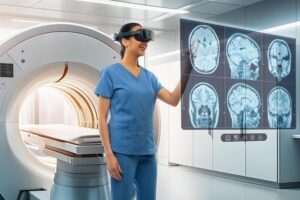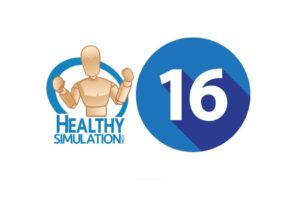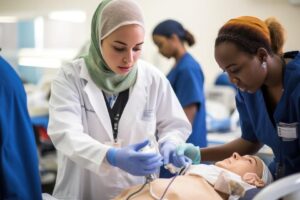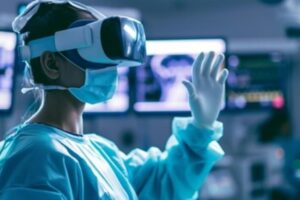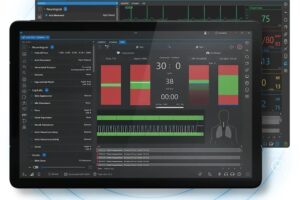Latest Clinical Simulation News From Around the World
From time to time, HealthySimulation.com writers scour the web to catch up on the latest healthcare simulation news from around the world. From new simulation centres, to mass casualty incident training events, and from overcoming COVID19 restrictions at nursing simulation programs to new glucometer simulators — check out some of the world’s latest clinical simulation news!
Fort Leonard Wood Soldiers fielding new casualty tech: According to Lt. Col. Rickardo Christopher, Medical Simulation product manager at the Program Executive Office for Simulation, Training and Instrumentation in Orlando, Florida, the TC3X provides realistic combat casualty care training. “It talks and responds like a real human would,” he said. “This device provides vital training needed to save Soldiers’ lives on the battlefield now as well as in the future.” “Usually, when we do training, we’ll have someone act as a casualty,” he said. “You give them a casualty feeder card that says what’s wrong with them. They might have some fake blood on them, but it’s hard to tell the difference between something that’s still bleeding and something that’s not bleeding. It takes away from the training value. With this, I can change things for each trainee. I can have the first trainee come up, and there’s inguinal bleeding and he’s got breathing troubles. I can have the next trainee come over and he’s got an amputation and no breathing trouble. That really amplifies the training — it’s a good tool for that.”
Patient Simulators Providing Experience During Covid: Associate Degree Nursing Instructor at WCC, Dr. Wendy DuBose said, “During this crisis more than ever I think that having this ability to continue their instruction has been very very important.” Access to healthcare agencies is limited but the center allows them to adapt. “Because it’s a simulated environment the Board of Nursing in particular does permit us to use a certain number of hours of their clinical experience to be derived from a setting such as this,” DuBose said. Allowing students to care for a patient that displays the issues they are addressing in class. “When you’re in the hospital you cannot guarantee every student will see every type of patient particularly the ones that you are currently discussing in your course,” DuBose said. ADN Student at Wallace Community College, Anna Perkins said, “If mistakes are made here its not on real people its just on the simulators so the mistakes that were made can be learned from that way if those situations come about in real life we can provide the adequate care to our patients.”
Sponsored Content:
Kern Medical reveals State-of-the-Art Simulation Center: A new State-of-the Art Simulation Center will be revealed at Kern Medical hospital in east Bakersfield. Kern Medical has invested more than $850,000 to create the Simulation Center to help train clinical staff on realistic patient scenarios and clinical problem-solving challenges. According to the hospital, the simulation is a training and feedback method in which medical personnel practice tasks and processes in life-like scenarios using simulation manikins. The Simulation Center is designed to simulate the patient flow process with a pre-hospital room, emergency room, operating room, intensive care unit, obstetric operating room, neonatal intensive care room, hospital room, training room and pharmacy.
Researcher develops innovative glucometer simulator training device: The new device is designed to facilitate the understanding and teaching of blood sampling, the interpretation of glucose level data and its implications in patient treatment planning. It includes a realistic adult sized hand with two refillable, self-closing finger blood pads. It features a simulated glucometer device which allows the tutor or trainer to pre-set a low, normal, high or completely randomized glucose reading. Blood samples may be drawn and measured using the reusable blood glucose test strips, producing a result which can then be interpreted by the learner. Diabetic patients and students can learn to recognize hypoglycaemia and hyperglycaemia through a simulated scenario and discuss the next appropriate clinical steps. The device is already being used to train Coventry University students, and Nina hopes that it will take away any fear or anxiety for patients and students in performing the procedure.
BC3 adds simulated patient to train future nurses: Simone’s stay, as the newest simulated patient at Butler County Community College’s Shaffer School of Nursing and Allied Health, will be a long one. Around the corner and up the carpeted inclined hallway, the human patient simulator Simon hasn’t left his hospital bed in years and infant simulator Simba hasn’t been out of her crib. BC3 added Simone in August to its inventory of state-of-the-art medical educational technology to prepare for an increase in enrollment resulting from partnerships with Grove City College and with Concordia Lutheran Ministries. These manikins will also help to educate BC3 students pursuing the college’s new licensed practical nursing program that is expected to debut next fall, said Dr. Patty Annear, dean of BC3’s Shaffer School of Nursing and Allied Health. The licensed practical nursing program is being created as a result of the partnership with Concordia Lutheran Ministries, based in Cabot, and is intended to address a regional shortage of registered nurses and licensed practical nurses.
USS Arlington Hosts Mass Casualty Drill with Walter Reed: This training exercise was the culmination of two months of planning and coordination between the Arlington, Surface Force Atlantic, Walter Reed and other various medical assets. This is the first time in naval history that this annual training is held on an LPD class ship. In prior years the training has been conducted on larger vessels, such as amphibious assault ships. During the drills, Sailors responded to mass casualty simulations on the ship and transported patients to the medical ward, while Arlington medical personnel provided training oversight.
Sponsored Content:
UMPI dedicates John Lisnik Nursing Simulation Center: To mark the completion of a new, 1,800-square-foot nursing lab at the University of Maine at Presque Isle, officials held a small, socially distanced gathering on Oct. 29 to formally dedicate the space as the John Lisnik Nursing Simulation Center. This state-of-the-art learning space was made possible through voter-approved bond funding and was named in honor of Presque Isle native John Lisnik, a longtime advocate for Maine students who served as the University of Maine System’s liaison to the Maine Legislature for more than two decades. The lab supports UMPI’s collaboration with the University of Maine at Fort Kent, which has delivered its bachelor of science in nursing degree program on the UMPI campus since fall 2018. With this expansion, and with both campuses’ continuing efforts to help address the statewide nursing cliff, officials hope to have between 100 and 120 nursing students working through the UMFK program on the UMPI campus by 2021.
VT Guard hosts trauma care training with North Macedonia: In an upstairs room at her home in New York, while her children and dogs play downstairs, Lt. Col. Sarah Davis, clinical nurse assigned to the 158th Medical Group, Vermont Air National Guard, logs on to her computer for a three-day, virtual trauma nurse training – the new normal during the COVID-19 pandemic. On another continent, time zones away, more than 10 nurses in the North Macedonian Armed Forces were also at home and logging onto their computers Sept. 28. These nurses, much like those in the Vermont National Guard, work in clinical environments and also train for contingency operations, similar to training over a drill weekend. Also logging in for this exercise was Capt. Michael Kelley, senior nurse for Company C (Med) of the 86th Infantry Brigade Combat Team (Mountain), Vermont Army National Guard. Kelley planned the agenda and presented multiple topics over this three-day course.
Mount Union nursing program adds pediatric simulator: University of Mount Union’s Department of Nursing has added a simulator to its pediatric classwork. The program has brought in a SimBaby simulator for students to use in the cutting-edge facilities. The SimBaby simulator represents a 9-month-old pediatric patient. Working in such a situation helps students meet course learning objectives focusing on initial assessment and treatment in a safe environment.
Subscribe for More of the Best Medical Simulation Updates!
Lance Baily, BA, EMT-B, is the Founder & CEO of HealthySimulation.com, which he started while serving as the Director of the Nevada System of Higher Education’s Clinical Simulation Center of Las Vegas back in 2010. Lance is also the Founder and acting Advisor to the Board of SimGHOSTS.org, the world’s only non-profit organization dedicated to supporting professionals operating healthcare simulation technologies. His co-edited Book: “Comprehensive Healthcare Simulation: Operations, Technology, and Innovative Practice” is cited as a key source for professional certification in the industry. Lance’s background also includes serving as a Simulation Technology Specialist for the LA Community College District, EMS fire fighting, Hollywood movie production, rescue diving, and global travel. He and his wife Abigail Baily, PhD live in Las Vegas, Nevada with their two amazing daughters.
Sponsored Content:











